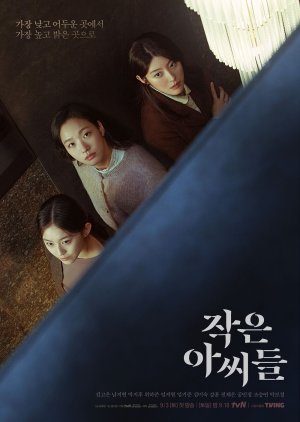
Everything was perfect until E08 after that......
For me Little Women was just a decent Watchable drama. Everything look so interesting and gripping in the start, too many Mysteries with a very good story telling, plot twists, and more. But all are for nothing actually from E09. Slowness is ok. Because i already knew this probably a slow poison in the start but i was completely wrong to be honest. Because after E08 everything is predictable or i predicted almost everything.So for me, i lost all the excitement. E08 ending was lit. But it all spoiled in the starting of E09. Politics is also unbearable. Too many unwanted story complications for nothing actually. If you think there will be a grand twist coming after all this, then don't fool yourself. Nothing was there. Actually if you can easily predict everything...
I thought this would be a good mystery serial murders kind of a story telling and unfold a large mystery with an unbelievable twist or something like this. But if you just look back after all 12 episodes you will probably get what i mean infact there was nothing but too many complication 🚶
Stunning cast and performance. And some characterisation, oh sister's are brilliant, even a simple detailing of their behaviour is superbly narrated. But it doesn't support the story.
Overall it's not a bad drama or must watch drama, it was a simple and decent drama to watch. Too many dragging after E08. Some point i thought even for just a 12 episodes they took so many time to conclude that story and what happen if they took 16.. 🥶
It's only my personal view.
#N45Views
Was this review helpful to you?
A Veritable Dollhouse of Absurdity
The experience of watching this so-called homage to Louisa M. Alcott’s beloved tale is like playing a game of blind man’s bluff. The audience is positioned as the player in the middle, blind-folded, groping around trying to make sense of the surroundings only to be led by a cacophony of sounds which may either prove to be helpful leads or egregious misdirections that lead to nowhere. Rather than being any kind of thoughtful of adaptation of Alcott’s timeless series, the roots of this Korean drama lie in the overlong weekend family dramas infamous for their ridiculous plot lines punctuated by unbelievable twists and turns, protracted conflicts that are designed to leave audiences begging for more week after week. It’s a combination of pure farce, high melodrama and an unabashed (even gleeful) exploitation of tropes. Polished as it may be, it is still a makjang. From the first, this story positions itself as a morality tale cautioning against the consequences of greed and ambition from its use of the red shoes motif only to end up with a bewildering incoherent resolution that undermines the story’s early messaging.The show throws the spotlight on two adult sisters from a working class background. They are Oh In-joo (Kim Go-eun), Oh In-kyung (Nam Ji-hyun) as well as their teenage sister Oh In-hye (Park Ji-hoo), a talented artist who has caught the eye of a certain Ms Won Sang-a (Uhm Ji-won), an ambitious wealthy woman who is married to an aspiring politician Park Jae-sang (Uhm Ki-hoon). The unsuspecting Oh sisters who lament their meagre lot in life are drawn into a web of deception on a scale that they are laughably ill-equipped to handle. It suits the writer’s agenda to place these babes in the woods in such an unlikely situation as they flounder around in search of answers.
The real trouble begins when In-joo a bookkeeper finds herself tempted by the offer of 2 billion won of cash left to her at the pleasure of her colleague Jin Hwa-young in a gym locker. It’s more money than In-joo has ever seen in her young life but it comes with a high price tag and puts her in an ethical predicament. Apparently Hwa-young has been playing around with Other People’s money and suffered the consequences. In-joo is in over her head and it’s Choi Do-il (Wi Ha-joon), her company’s accounting manager and money laundering expert, to rescue. Apparently the company has a habit of accumulating ill-gotten money and key people in the organization are involved in helping the Park-Won family creating slush funds to further their political ambitions.
While the performances range from great (Kim Go-eun, Wi Ha-joon and Uhm Ji-won) to good, in the overall scheme of things the characters don’t matter much because they are quite literally putty in someone’s hands. They exist to tell a story like miniatures in a diorama or figures in a dollhouse. The dollhouse metaphor is deliberate on the part of the writer who wants to weave a fairytale about the ordinary confronting the extraordinary similar to any Brothers Grimm tale. While there are no talking animals or supernatural beings in the mix, the show nevertheless relies heavily on miracles. The Oh sisters are fated to embark on a journey through a dark forest of evil and they cannot be certain who is friend or foe. They are almost always somebody’s plaything and dependant on the goodwill of others for their survival. There is an appearance of agency but the Oh sisters can only react to the situations they inevitably find themselves in due to the machinations of others.
There’s little that is relatable about the Oh sisters. They act impetuously in service of the plot. There’s nothing realistic about them or the situation they find themselves. At times it’s hard to believe that they might have been a close-knit family once when they spend far more time with others than each other. Using In-joo and In-kyung in particular as the primary windows into this world is a double-edged sword. More often than not their supposed bravery comes across as recklessness and lack of circumspection.
Won Sang-a the show’s primary antagonist fancies herself an unfulfilled thespian and plays out her fantasies with lesser mortals. She’s General Won’s daughter and her wealth enables her to indulge in her narcissism and megalomania. She likes secrets and she takes perverse pleasure in gamefying scenarios involving desperate malleable individuals where she commands their inevitable outcome. On the other hand her relationship with husband Park Jae-sang involves a series of sex games in which she manipulates him while he enables and cleans up after her. At first it seems like he’s a controlling abusive husband but it doesn’t take long before it’s clear who’s really calling the shots in that dynamic. She represents the figure of the witch that’s the staple of many beloved fairytale as she’s an inveterate schemer and master manipulator that casts her spell on those she deems dispensable.
In that vein Little Women is a witch’s brew as it mixes high stakes criminal activities with family dysfunction, romances and a conspiracy that goes back decades. The set-up brimming with potential, hitting the climax in Episode 10 only to end with a whimper in Episode 12. For a show that traded relentlessly on plot twists and shock factor, the finale felt strangely flat and mind numbingly… tedious. In effect the writer overplayed her hand ad absurdism; to the point where the final showdown between the protagonist and antagonist feels comedic rather than revelatory thus diminishing the impact of the moment.
Despite the title, the highlight of the viewing experience is Choi Do-il, who grounds the show for me. Almost everything else about the show is a farce in every sense but Do-il feels like a bright spot in a bleakly surreal landscape and more’s the pity that this show isn’t about him. Although he makes claims to being entirely mercenary, he is the sanest creature in this cat and mouse insanity — a reassuring constant in a sea of madness for the artless In-joo. He is her lifeline from start to finish. Without him she would be six foot under or ashes in an urn. The romantic tension between them evidenced from the start regrettably doesn’t have closure which begs the question — is the show leaving the door open for a second series?
A show like this can be an engaging watch depending on mood and the extent one is willing to suspend all manner of disbelief because at the end of the day such dramas don’t exactly prioritise logic or consistency.
Was this review helpful to you?

More Alice in Wonderland than Little Women
Loosely based on Little Women is the sort of loose that happens when the elastic in your trackies gives way and they drop to your ankles in a wrinkled heap. Yes they are still trackies, but not obviously so. I spent the first episode distracted by trying to unsuccessfully work out how this drama maps to the book. But I was looking in the wrong place, because, although there are parallels to be found, the map is really in the theme: the significance of money.This is fundamentally a story about money and its sidekick—power (the perennial obsessions of K-dramas, well maybe most dramas actually…). How and why it shapes lives, morals, choices and character. How poverty shapes your mentality and expectations. What you are willing to let it buy and what that does to your integrity. What risks you are willing to take to acquire and keep it. Under what conditions you will let it go. The price that your decisions exact from both you and those around you.
It puts the protectors, helpers, underminers and benefactors of the wealthy centre stage and examines their motives and desires. This is a rare perspective and I can only remember it being the centre of a drama in one other totally brilliant case, “Secret Love Affair” (if you are interested in this aspect, watch SLA, it will not disappoint, although it’s not a thriller).
As you can guess by now, it is not the plot that makes this drama special, (more about that later) although you can simply watch it as a thriller. It’s the examination and unfolding of motive behind the fight for freedom and opportunity in a world that values money over the individual. A society that insists we fight for limited resources to fulfil not only our dreams but our basic survival as well.
It’s almost impossible for us to imagine a society not based on money. But money itself is not of course concretely real, it is simply a universally accepted system of sharing resources that becomes meaningless if we lose trust in it. It is the illusion around which our reality and dreams are built. And if you are going to be fanciful, you could watch this drama as a commentary on the system’s strengths and weaknesses and the approach people take to best work it. Given that it is compulsory to engage in this system, the question as to what is morally acceptable and what is personally justified is core to the unfolding of the narrative.
Having said all that, there are problems in my opinion with how the drama is written and presented. There’s a vibe of the sisters being ordinary people (a reference to Little Women perhaps) who are unwittingly and sometimes unwillingly mixed up in something big.
However, through most of the drama, the sisters don’t display enough realistic, long-term emotional reactions to support their ordinariness in the extraordinary and violent situations that surround them. In a normal thriller we suspend disbelief because the whole thing is not related to any recognisable reality in the first place. Here, particularly in the middle section, I am being made aware of the gap between quasi normality and the world of the story with the result that I am also very aware of suspending my disbelief. And at times I found the approach is not subtle enough to make it work.
Because the women are presented as relative amateurs, there are moments that stretched my credulity to breaking point. For instance, without any preparation and seemingly without backup, they are willing to confront people they think are probably murderers. There are scenes where professionals who would never disclose information to anyone let alone the naive woman in front of them, disclose it. Etc, etc.
There’s an odd mix of the ordinary, the extraordinary and the completely surreal. The more surreal it gets the less the ordinary women at the heart of it are credible. It turns into conspiracy theory central with hallucinogens thrown in for good measure. Whether this was intended as a reflection of the madness that money creates in people is debatable.
The plot gets increasingly bizarre and takes off in strange directions and at times loses impetus. This has a fragmenting effect which leaks tension and can be frustrating. But at other times the sense of confusion and powerlessness is very effective in putting you into the shoes of the protagonists.
Overall, this is an ambitious drama and when it works it really works, and when it doesn’t, it really doesn’t. I’m someone who is prepared to put up with stuff not always working well if an attempt is being made to experiment with something new and different. I think this drama tries to do that, so I was happy to give it the benefit of the doubt, but even my goodwill was tested beyond its limits by the end.
What my rating means: 7+ A watchable drama, but nothing exceptional. Good enough to qualify for the race, but finished with the pack. The sort of thing that promises more than it delivers.
Was this review helpful to you?

This review may contain spoilers
A Flawed and Twisted Tale of Dumb, Dumber and Ingrate
First of all, this kdrama has next to no connection to the classical American novel of the same name. It only loosely based its characters on it, namely - the three poor sisters, their rich great aunt and a male friend of the family who simps over one of the sisters. The rest is pure fiction with popular contrived tropes used in kdramas:-evil chaebols;
-corruption;
-secret organization with unlimited power;
-off their rockers villains;
-makjang.
PLOT:
The first half of the show is great and promises a potential masterpiece. It starts fresh, with relevant topics raised about poverty, social issues and is mixed with murder mystery. Every episode manages to rile up new emotions in the audience with unexpected plot twists and sympathy for the characters suffering injustice. Small niggle starts to appear with the introduction of the conspiracy theory trope - the powerful secret society (#Illuminati), and fantastical properties of blue orchids.
And after a shocking finale of superb episode 8 it rapidly starts to go downhill with reveal that the main villain is just a deeply deranged person who likes to play with the victims before killing them. Absurdity, increased usage of makjang tropes, dumb circus and public shows are introduced in the next episodes until it all culminates in a cringey finale where none of the villains get what they deserve (they all die instead of rotting in prison for their crimes) and little women get what they deserve (money!) but at the cost of other people's fortune.
The tale of the ill gotten money, that is the catalyst of this whole plot, is a long winded one, but in the end the three sisters get their hands on it with the help of ML, even though originally it belonged to the victims of the bank made bankrupt by the villains.
The final message was supposed to be that ill gotten money is evil, it's not worth chasing if it costs someone's life, better live in honest poverty than dead or rotting in jail. But that message is completely negated by giving said money to the sisters anyway in the end. The hypocricy is apparently lost on everybody in the end, because that's where the show conveniently ends.
CHARACTERS:
First of all, lead female characters here are deliberately made dumb, flawed and reckless. It was script writer's conscious decision as was reported in the interview with her.
The dumbest of them all is the bookkeeper eldest sister, who throughout the whole drama made only 1 smart decision (to swap the cash with bricks), the rest was sheer luck or help from other characters. But what her character lacks in intelligence, is compensated by her love of her friends and family. She manages to forgive and save her friend, who basically set her up big time and put her in great danger, from certain death. And she'd do absolutely anything for her sisters. Being poor through all her life though, her next greatest love understandably is money and she makes a lot of stupid mistakes after a very large ill gotten sum of it is suddenly left to her as a gift. But stupidity must be punished, so in the end her character does suffer a bit to reflect on what she did wrong according to law. She's rewarded with her material dream by the end of the show.
The reporter middle-sister is a bit smarter than her elder sister. She is self righteous and claims to have unbending integrity and high morals, but they are heavily tested as her sisters get themselves in trouble and lawless methods that villains use make her fail to expose them again and again. In the end she succeeds in her investigation and gets together with a male long time family friend who helped/followed her throughout the episodes. However their romance from friends to lovers is very weak and that male character is one of the most useless in the whole drama.
The youngest sister is the epitome of a teenager during "a phase" - an ungrateful little brat who throughout the whole drama never once said a grateful word to her sisters who'd do absolutely anything for her. Instead, her grand plan was to get away from her poor family and get rich and comfy life quick by befriending the villains daughter. And she did succeed in that in the end without too much of a hassle, so I guess she was the smartest of them all. Some people claim that she did thank her sisters in the end by getting each of them a share of that ill gotten money. But she didn't actually, it was all ML who just accidentaly met them running away and decided to use her friend's account for a while (though he could have as easily have done it by himself). In the end her role was downsized to a minimum, a pretty selfish and consistently ungrateful character, who just had to be there because there had to be 3 sisters.
The villains of the evil secret society were several, but in the end only the main one is worthy of note. The society itself turned out to be not as powerful and omniprescient as was advertised. It's a drama about women, from women's perspective and so the main villain is also a woman. Her character development from a prim and proper house wife, that stands in support of her brilliant husband, to a crazy deranged psycho was entertaining to watch, but in the end, after her husband died for the cause, her house of cards crumbled easily and the final showdown with her was a total cringefest on par to the cringiest of the makjang dramas out there. Guess her character wasn't smart either without outside help.
And lastly whom I'd call the real main hero of this whole drama, the male lead, the guy who will give you major trust issues trauma throughout the episodes, the mysterious, the most confident and smartest of them all, the man with the plan - Choi Do-Il. He was a real safe haven of rationality and smart decisions in this drama plot's sea of random dumbassery and craziness. Probably the most favorite character of them all in this drama.
Of course, there was also his cool and badass commando father, but he was conveniently swept under the rug and forgotten about in the craziness of the last episode.
PRODUCTION VALUE:
It was excellent and just screamed quality. Cinematography was one of the best I've seen in kdramas, very well made.
Music was also very good and catchy.
Actors work overall was great as well. Kim Go Eun finally landed a role she was not a miscast for. The villains actors were absolutely infuriating to watch, they did really great, loved to hate them.
The only one who I think could have done better was the youngest sister's actress - Park Ji Hoo. She was too stiff and had samey facial expressions all the time. But since she's an underage noob I'll give her some slack.
Overall, it's an exciting and flashy drama, that reveals one shocking and unexpected twist after another at a breakneck speed, hoping you won't notice plot holes, dumbassery and shallowness under the surface. And introduction of certain badly chosen cringey tropes in later episodes ruined its twisted mess of a plot in the end. Could have been a true masterpiece otherwise, a shame. I give it a generous 8 out 10 overall.
Was this review helpful to you?

Dramatic at times but meh
I went into watching Little Women blind with only the idea that it's based on a book that I hadn't read but had heard was quite good. I don't find this Korean adaptation to be special. It left me questioning many things that didn't quite make sense.Yes, Little Women has wonderful cinematography and the director knows how to build suspense and anxiety but at times I felt like the motivation behind everything lacked any kind of logic and the end folded so neatly, it was actually both a relief and disappointing.
I wish I could make sense of why the society functioned the way it did. Felt meaningless and unbelievable that no one questioned a thing.
Although the Oh sisters irked me in many instances, I was genuinely rooting for In Joo and In Kyung. Oh In Hye will go down as 2022's most annoying main character. So selfish and ungrateful! I prefer any of the villains over her because at least you understand them to a degree.
Loved the mysterious Choi Do Il and it was fun reading viewers speculate. It's unfortunate that the other male character is nothing to write home about.
If you enjoy suspense, then you might enjoy the rollercoaster ride this show takes you on. However, the ending is not very dramatic. If romance draws you in then you might want to give this one a skip.
Was this review helpful to you?

This review may contain spoilers
SISTERHOOD, MYSTERY, AND FEMINISM SHINE IN LITTLE WOMEN
This drama reminded me a lot of the hollywood film movie Little Women, especially with its themes of feminism and how women try to stand and strong in a tough world. It has the same focus on sisterhood but told in a darker, more thriller-like way.The three sisters are written with clear differences, and I found myself understanding each of their behaviors and choices. In Joo’s vulnerability and longing for a better life, In Kyung’s stubborn yet idealistic pursuit of justice, and In Hye’s quiet independence all felt distinct but interconnected. Their contrasting personalities and imperfections made the drama more complex, and realistic.
I also really liked the chemistry between In Joo and Do Il. Their connection was subtle but strong, and I appreciated that their relationship was left open ended, it gave a sense of possibility without forcing a conclusion.
The blue orchid subplot was another highlight for me. It added mystery and symbolism that blended well with the overall narrative, making the story more intriguing. On top of that, the cinematography was beautiful and the ost/score/soundtracks are so good that I immediately listened them all after watching.
The story can feel a little messy at times, with multiple twists that sometimes overlap more than they should. But even with that, it is still worth watching for its themes, performances, and artistic execution.
Overall, Little Women is not perfect, but it’s a captivating drama that reimagines sisterhood, ambition, and survival in a unique way.
Plot 8/10
Acting and Characters 9/10
Cinematography 9/10
Writing 7.5/10
Pacing 8/10
OST/Score 9.5/10
Overall 8.5/10
Was this review helpful to you?

Watchable with Many Twists and Turns
If you are looking for a show to pass the time and keep you occupied without expecting a tight or somewhat believable plot, this is a show that fits the bill. The plot is crazy over the top and has a little bit of supernatural aspects to it. The main actresses and actors are talented so the acting is done well despite the storyline being so-so. There are several parts which keeps you guessing, its not entirely clear where some of the characters stand with the FLs and whether they can be trusted.I came into this not expecting a love story or romance and so far that is the case. Nothing sweet or sappy is doled out for the viewer. It does have the standard good poor versus the bad rich theme etched into this. Its about the relationships of sisters and friends, absentee neglectful parents, socioeconomic discrepancies, and how far one is willing to go to break from the chains of poverty to become rich.
While the plot has its many holes, some of the scenes were well acted and writing for the dialog were well written, some examples of scenes which stood out:
- The confrontation of the reporter sister with her reporter nemesis on the sides of truth
- The Villain Heiress confronts the sister in prison and remarks you only thought of the gains from the 70 billion won but never thought of the pain from it
It's engaging enough for me to finish this and rooting for the FLs.
Was this review helpful to you?

This review may contain spoilers
Very gripping story but got ruined due to historical distortion
i just want little women watchers to be aware of the history distortion and that the vietnamese government requested netflix vietnam to remove it from the platform (now removed). as a little women enjoyer myself, im very disappointed about thisi was feeling iffy when they included it in the plot because kdramas have quite the rep when it comes to inaccurate portrayal of historical events. dont see how the vietnam war is necessary to the plot at this point
this drama couldve been perfect but alas korean media and their never ending list of unnecessary problematic additions to the plot. when will they learn
my favourite part about this drama was the cast especially goeun as injoo and hajoon as Doil. i wish to see them together in a project again
Was this review helpful to you?
Dark Money, Darker Roots
Little Women may borrow its title from the classic novel, but this 2022 Korean drama spins an entirely original tale—a suspenseful, high-stakes thriller built around three sisters entangled in a conspiracy far beyond their station.The story begins with Oh In-Joo, Oh In-Kyung, and Oh In-Hye—three sisters raised in poverty, bound by hardship, and fiercely protective of one another. The eldest, In-Joo, is a soft-hearted bookkeeper who dreams not of success but of security—preferably via a wealthy husband. Easily manipulated and prone to panic, she often acts without thinking. At one point, she literally hauls a giant bag of cash through the city like a sitting duck, with no foresight to split or hide the money. At first, you might dismiss her as naive or even dimwitted—but as the drama unfolds, her loyalty to her sisters and only friend becomes her quiet strength.
In contrast, second sister In-Kyung is a firebrand journalist, fearless but reckless. She plunges into investigations with raw conviction, unafraid to call out the powerful, even at great personal cost. Her moral compass is unwavering, but her impulsiveness gets her fired from her job and lands her in peril more than once.
Youngest sister In-Hye is the most composed of the three, but also the most distant. An aspiring artist, she resents the suffocating love of her older sisters and gravitates toward her wealthy classmate’s opulent world—a world that promises beauty, freedom, and escape. Yet, as the glitter begins to crack, she too is forced to confront the price of power.
What starts as a tale of sisterhood spirals into a dark labyrinth of secrets, betrayal, and a shadowy organisation that launders money and eliminates obstacles—permanently. The stakes keep rising, as the sisters find themselves at odds with political figures aiming for the country’s highest office. Layer by layer, the story peels back truths hidden beneath sleek veneers of wealth and influence.
The plot is full of sharp twists and simmering tension. Just when you think you know who is pulling the strings, the story flips again. The mysterious blue orchid—eerie, elegant, and ever-present—acts as a chilling calling card for a string of deaths. Its significance is gradually revealed, leading to the unmasking of a true psychopath with ambitions to lead the clandestine society behind it all.
As if the domestic chaos were not enough, the drama takes an international turn with a gripping roller-coaster in Singapore—complete with stolen identity, an mysterious doppelgänger, hide and seek, clandestine meetings, the opulent high-life and a fresh layer of intrigue.
What truly elevates Little Women is the emotional evolution of the sisters. Each one grows—not just braver, but wiser. In-Joo finds her own voice. In-Kyung learns restraint without compromising her integrity. In-Hye discovers what love truly means beyond admiration and envy. By the final episode, they are no longer victims or pawns, but women who have stared down power, survived it, and reclaimed their lives.
Verdict:
Little Women is not just a thriller—it is a psychological drama about sisterhood, identity, and the cost of ambition in a corrupt world. Unpredictable, stylish, and emotionally gripping, it is a must-watch that lingers long after the final reveal. Highly recommended.
Was this review helpful to you?

Waste of my time and it will be a waste of yours
Honestly, at first, I thought it would be very interesting. But then they went and continued the show.The only likable character was Choi Do Ill. And that's it. The first two sisters were just annoying and downright stupid. And don't even get me started on In-hye, I hated that girl to the very last fiber in my body. Such an ungrateful, teenager that only whines and leaves her family behind just to live off of someone else's money. People only try to excuse her actions by calling her a child.
The way that the evil characters got away with literally everything so conveniently even when the people had FREAKING VIDEOS OF THEM COMMITTING CRIME!!! was another triggering thing. And the bad guys were comically villian-like.
Overall, the story was quite predictable and bland. Only watched it for the one likable character to see where it goes but nothing really went anywhere.
Was this review helpful to you?

A complex political thriller with family drama and personal growth
While the show is dark and serious, it's really engaging. There are numerous plot threads weaving through this series, centering around three sisters characters. The eldest sister who is an outcast at her company because she's poor, lacks a higher education, is divorced, and is also attractive. She forms a unique friendship with another outcast who hides her luxurious alter ego. This relationship leads to our eldest sister gaining possession of a significant sum of money, tainted by corruption. The middle sister is a passionate reporter investigating the background and family connections of a politician running for Seoul's mayor. However, she struggles with alcoholism and often becomes emotional on camera. The youngest sister is an exceptionally talented artist who won a scholarship to a prestigious art school in South Korea. She forms a close friendship with a wealthy girl from the school, essentially becoming part of the rich family. This doesn't sit well with her elder sisters, who suspect that the rich family has ulterior motives. Furthermore, the rich family connected to the youngest sister is the very same family that our second sister, the reporter, is investigating. The connections become increasingly messy as the story unfolds.Now, this show has an exceptional cast. They delivered outstanding performances, with the eldest sister standing out due to her character's development and screen time. The cinematography is a masterpiece, the set design and overall color grading are meticulously crafted, with subtle clues woven into the details. Also the music is as beautiful as the visuals.
What I don't like are the characters and the story all throughout. The sisters seem so unlikeable and dim, they keep making choices that put them in jeopardy. It was painful to watch them being played over and over again by people around them, it feels that the plot just keep happening around them just for performances. While plot twist after plot twist keep happening, the last 4 episodes do not round the story very well.
-Oct 2023, Yovita
Find me on Instagram: @kdramajudge
Was this review helpful to you?

This review may contain spoilers
Intriguing drama until almost the end.
It started as a very enjoyable take on what money and greed does to people, the first episodes were full of mystery.The sister family were little fishes swimming in a tank full of sharks, and you just knew something was off with the Parks, in that feeling of weariness every time they appeared.
Once the drama starts having multiple twists and turns, you just wait for the unavoidable "they are not going to close this perfectly." It's impossible, because there was a lot of stuff that stopped making sense a long time ago.
But I have to say, the drama did try to accommodate almost all the plot points, to write and continue and finish off a somehow believable plot. But I won't lie, a bit of suspension of disbelief is heavily needed, specially towards the end.
I didn't like they used the old "SHE WAS NOT DEAD" soap opera main plot, I think they lost me a little there. I was expecting a final showdown between Hwa Young and Sang A, but it never happened. Furthermore, I was expecting a final showdown between In Kyung and Park JaeSang, but it also never happened. But oh well. It's not as bad as I expected.
That to say, this drama was perfect up until the Singapore episodes, delivering what it is one of the most engaging episodes I've seen lately in any K-drama. To the point at times I was sad it ended, and I am not made for the 1 hour, or 1 hour 20 minutes dramas last.
The downfall of Park Jaesang was perhaps my last favorite moment. The moment Jaesang is out of the pictures, for pretty unclear motives, but still (probably shock value), the drama initiates a total downfall, but still manages to survive.
The acting is impeccable, specially Kim Go Eun and Uhm Ji won deliver an engaging mouse and cat chase. I also enjoyed, to a lesser degree, Ji hyun and Ji hoo performances. And I think they didn't give much chance for other characters to shine more, except maybe Ki Joon.
So, apart from that ending, which I understood at some point, was impossible to be perfect, I will say this has been one of my most enjoyed K-dramas of 2022.
Was this review helpful to you?


































